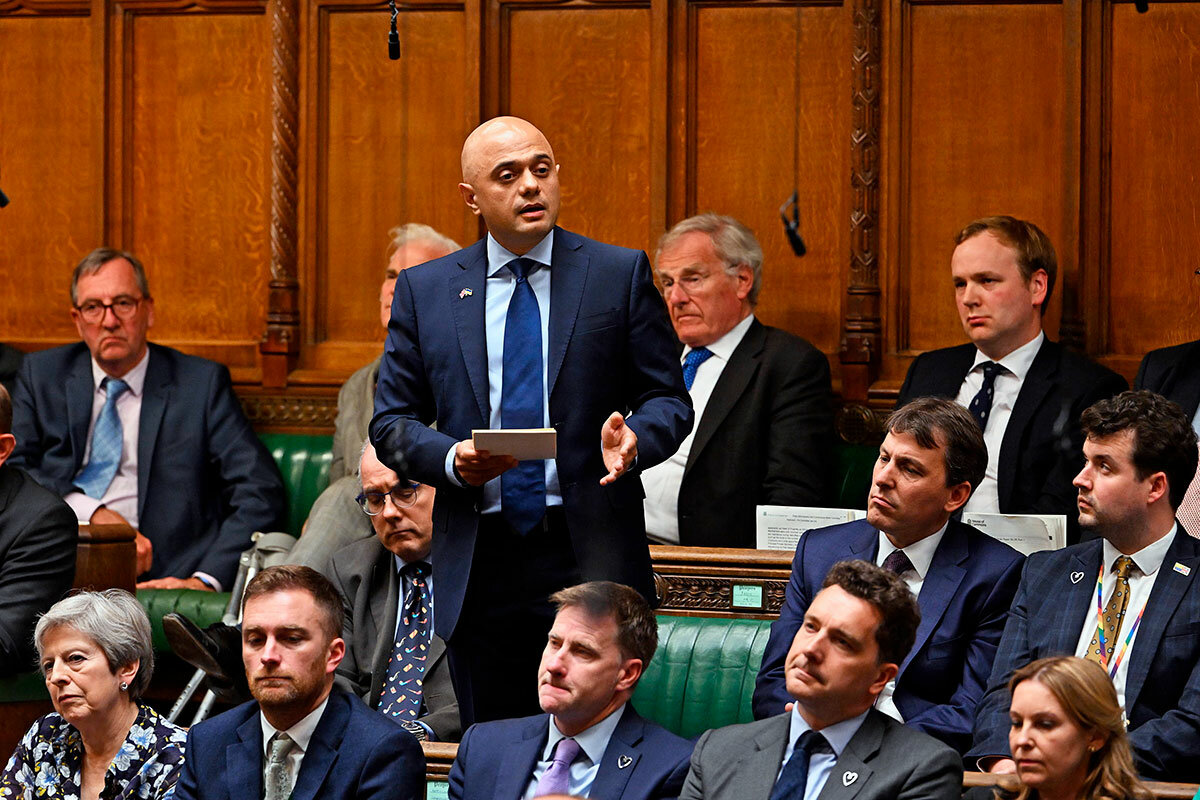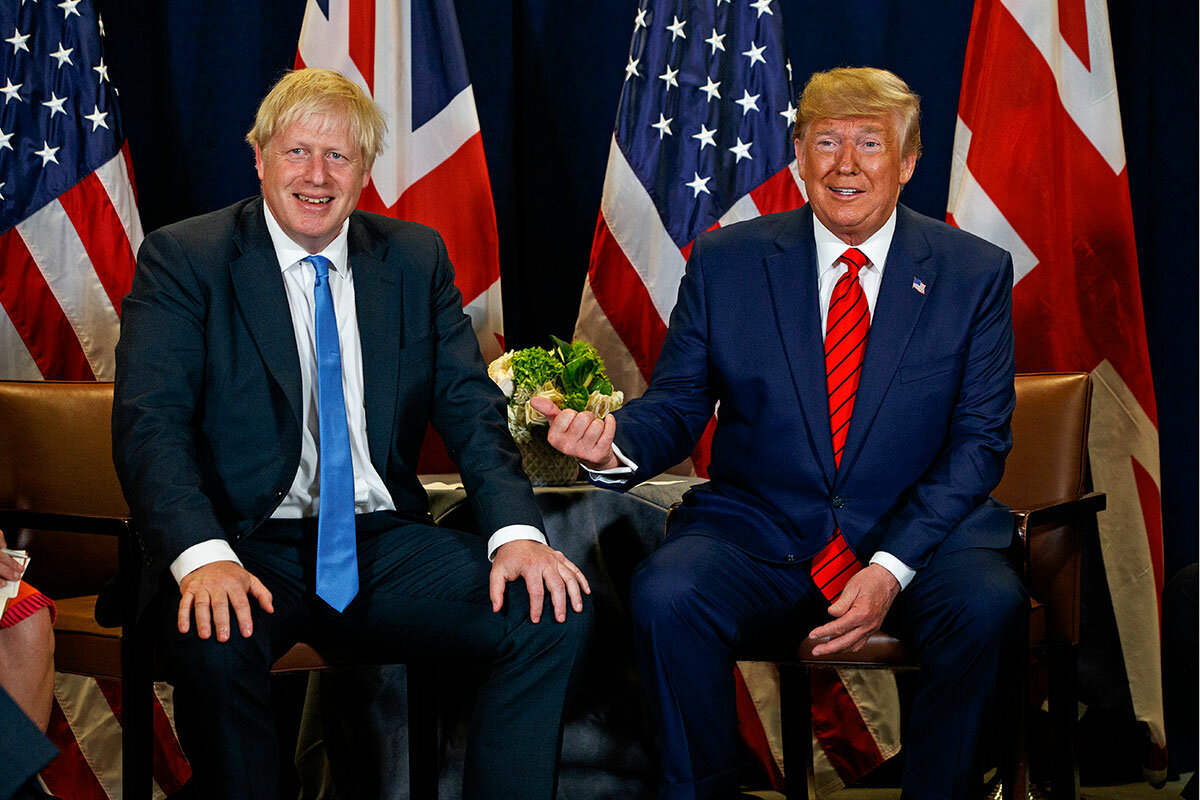British Conservatives ditch Johnson; US Republicans spare Trump
Loading...
| London
Until the very last moment – flamboyantly self-confident that only he could fix what ailed his country and the world – he was determined to hold on to the highest office in the land.
But in the end, British Prime Minister Boris Johnson strode quietly to a plain wooden podium in front of No. 10 Downing St. and announced he was resigning and would leave office once a successor was in place.
No refusal to accept reality, no challenges to the legitimacy of his rejection by the party he led, no calls on his supporters to storm the houses of Parliament.
Why We Wrote This
A nation’s political values are often evident in the way people unseat their leaders. A comparison of Boris Johnson’s and Donald Trump’s fates is instructive.
The differences between Mr. Johnson’s fall and Donald Trump’s conceivably temporary departure from the White House were not due to any fundamental differences between the two leaders. Indeed, supporters and opponents alike had been commenting on the two men’s similarities, their populist flair and fire and their apparent belief that previously accepted rules of conduct in public life simply didn’t apply to them.
What Mr. Johnson’s extraordinarily sudden exit demonstrated – hours after repeatedly, and publicly, insisting he was going nowhere – was the profound difference between the political and social cultures of the two allied democracies.
Put simply, most British people by far, and most members of Parliament, still believe the rules of public conduct do matter. As former Health Secretary Sajid Javid, one of the many ministers to have deserted Mr. Johnson in the past 48 hours, put it, “honesty and integrity” are important.
That, above all, is what spelled the end of his time in Downing Street.
That was in stark contrast to Mr. Trump’s abiding popularity and influence among Republican voters and politicians in the United States. There, unlike in Britain, a battlefield sense of politics divided into two implacably opposed armies seems to have left little space for the kind of broad, national debate on public behavior that forced Mr. Johnson from office.
And while some of the “culture war” language that has divided U.S. politics even more bitterly is making its way across the Atlantic, it has yet to gain similar traction in Britain.
The mechanics of Mr. Johnson’s demise were important. And there, too, the transatlantic differences are significant. Britain is a parliamentary system. The prime minister isn’t directly elected like an American president.
He holds office merely as leader of the dominant party in the House of Commons, and it is his party that will now choose the next prime minister.
The unavoidable problem Mr. Johnson faced in the end was that his own parliamentary colleagues deserted him – one by one at first, and then in a tidal wave that saw more than 50 ministers resign in two days.
They were not simply casting moral judgment on the prime minister. Like all politicians, they were guided by their own interests as well.
And they acted because of what Mr. Javid described as the forceful message they received from their constituents, a message of disenchantment, anger, and even disgust over a growing list of Mr. Johnson’s personal scandals and public untruths.
Disenchantment had been building since it became known Mr. Johnson and his staff had broken the strict pandemic lockdown rules they imposed on the rest of the country. But it reached a new level this week when it emerged that Mr. Johnson had promoted an MP despite knowing that he had been accused of inappropriate sexual advances toward young men, and incorrectly denying he was aware of this.
This week’s wholesale desertion by longtime political allies was all the more significant because many of the same social and political trends that elevated Mr. Trump to power have been taking root in Britain as well.
There’s been an erosion of trust in mainstream politicians, a feeling that is especially strong among voters in working-class communities in the north of England that are doing far less well economically than London and the south.
In the United States, a similar sentiment helped Mr. Trump to victory in the 2016 presidential election; in Britain it was critical to a victory for the campaign – led by Mr. Johnson – to withdraw from the European Union.
He then rode the Brexit cause to the prime ministership, and led the Conservatives to a landslide victory in 2019 under the slogan “get Brexit done.” Crucially, he wrested a number of parliamentary seats away from the opposition Labour Party in working-class areas in the north.
This week, however, his colleagues seemed to conclude that Brexit was no longer likely to prove sufficient to hold on to those gains at the next elections, and, more importantly, that Mr. Johnson was simply too tainted, and his personal appeal too damaged, to make the case to the voters.
Why? Honesty and integrity, as Mr. Javid said. And, as a Conservative MP told reporters once news broke that Mr. Johnson was leaving, another, related imperative: “the country’s trust.”







